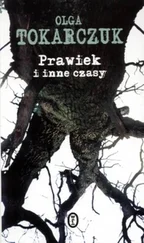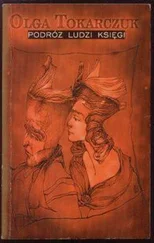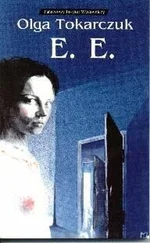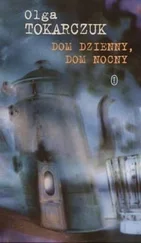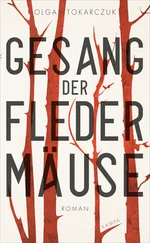One day a young forester turned up at Stasia’s place in search of vodka. There was a heatwave, so she invited him to sit down and have some fruit juice. He thanked her and immediately downed two glasses.
“What delicious juice. Do you make it yourself?”
Stasia said yes, and for some reason her heart began to pound. The forester was a handsome man, though still very young. Too young. He wasn’t tall but he was burly. He had a fine black moustache and lively hazel eyes. She carefully wrapped a bottle for him in newspaper. After that the forester came by again, and once again she gave him some fruit juice. They chatted for a while. And later on, one evening, he knocked as she was getting undressed for bed. He was tipsy. She quickly put on her dress. This time he didn’t want a bottle to take away. He wanted to drink. She poured him a glass of vodka, sat on the edge of the couch and watched him knock it back. He lit a cigarette and looked around the annex. He cleared his throat, as if wanting to say something. Stasia sensed it was an unusual moment. She fetched another glass and filled both to the brim. They picked up the glasses and clinked them together. The forester drank, and shook the last few drops from his glass onto the floor in the traditional way. Then he suddenly put his hand on Stasia’s knee. His mere touch was enough to make her feel so weak that she leaned back and lay supine on the couch. The forester fell on top of her and started kissing her neck. Just then it occurred to Stasia that she was wearing an old, patched and extended bra and some baggy knickers, so as he was kissing her she slipped them both off herself. The forester violently forced his way into her, and those were the finest minutes in Stasia’s life.
Once it was all over, she was afraid to move underneath him. He got up without looking at her and buttoned his trousers. He muttered something and headed straight for the door. She watched as he struggled with the lock. He left, without even closing the door behind him.
Ever since he had learned to read and write, Izydor had been fascinated by letters. He collected them in an old shoe box – everything that came to the Boskis’ house. Most of them were official letters, recognisable by the titles “Citizen” or “Comrade” on the envelope. Inside they were full of mysterious abbreviations such as “i.e.,” “etc.” and “e.g.” There were also lots of postcards in the shoe box – black-and-white panoramas of the Tatra mountains, or black-and-white seas, with the same messages every year: “Warmest greetings from Krynica,” or “Best wishes from the High Tatras,” or “Merry Christmas and Happy New Year.” Now and then Izydor took out the ever growing collection and saw how the ink was fading, and how the dates were getting funnily distant. What had happened to “Easter 1948”? Or “20 December 1949”? Or “Krynica, August ’51”? What did it mean that they were past and gone? Were they gone in the same way as the views, which are left behind as people travel onwards, but which must still be somewhere and remain there for other people to see? Perhaps time prefers to erase all trace of itself, reduce the past to dust and destroy it forever?
Thanks to the cards Izydor discovered stamps. He could not get his head around the fact that they were so small, so fragile and perishable, and yet they contained miniature worlds. “Just like people,” he thought, and carefully unstuck them from letters and postcards over a steaming kettle. He laid the stamps out on newspaper and spent hours examining them. There were animals and distant countries on them, precious stones and fish from faraway seas, ships and aeroplanes, famous people and historical events. Just one thing bothered Izydor – that their subtle drawings were spoiled by the ink from the postmarks. Before he died, his father showed him a fairly simple way to remove the ink. All it took was some egg white and a little patience. It was the most important lesson he ever learned from his father.
In this way Izydor became the owner of a large collection of pretty decent stamps. Now he could write letters himself, if only he had someone to write to. He thought of Ruta, but every thought of her caused him pain. Ruta was not there, and he couldn’t write her a letter. Like time, Ruta had passed him by and crumbled to dust.
Sometime around 1962, thanks to Ukleja, a very colourful German magazine full of advertisements ended up at the Boskis’ house. Izydor spent days on end looking at it, and was amazed by all the long, unpronounceable words. In the local library he dug out a pre-war German-Polish dictionary, containing far more German words than just raus , schnell , and Hände hoch , which everyone in Primeval had learned during the war. Then one of the summer vacationers gave Izydor a small dictionary to keep, and Izydor wrote his first letter ever. In German: “Please send me car catalogues and tourist brochures. My name is Izydor Niebieski. This is my address.” He stuck several of his finest stamps on the envelope and made his way to the post office in Jeszkotle. A lady clerk in a shiny black apron took the letter from him, examined the stamps, and placed it in a compartment.
“That’s it. Thank you,” she said.
Shifting from one foot to the other, Izydor went on standing at the window.
“It won’t get lost, will it? It won’t go astray, will it?”
“If you’re in doubt, send it registered. But it costs more.”
Izydor stuck on more stamps and spent a long time filling in a form. The clerk gave his letter a number.
A few weeks later a thick white envelope came, addressed to Izydor. It had foreign, completely different stamps, to which Izydor’s eyes were unaccustomed. Inside there were advertisements for Mercedes-Benz cars and tourist brochures from various travel agencies.
Never in his life before had Izydor felt so important. And that evening as he looked at his brochures once more, he thought of Ruta again.
Mercedes-Benz and the German travel agencies gave Izydor so much courage that he started sending several registered letters a month. He also asked Adelka and Antek, who were at boarding schools somewhere beyond Kielce, to bring him all their old stamps. After removing the postmarks he stuck them on his letters. Sometimes he managed to sell some brochures to someone for a small amount. He kept receiving new brochures and new addresses.
Now he got in touch with German, Swiss, Belgian, and French tourist firms. He was sent colour photos of the Côte d’Azure, folders full of the sombre landscapes of Brittany and crystal-clear views of the Alps. He spent nights on end looking at them in delight, though he knew that for him they only existed on smooth paper smelling of ink. He showed them to Misia and his nieces. Misia said:
“How beautiful.”
Then a small thing happened that changed Izydor’s life: a letter got lost.
It was a registered one that Izydor had sent to a camera company in Hamburg, with a request for brochures, of course. This company always wrote back to him, but this time there was no reply. All night Izydor wondered how his registered letter could have got lost, as a receipt had been made out for it and a number assigned to it. Wasn’t that meant to be a guarantee of indestructibility? Maybe it had been stopped in Poland? Maybe the drunken postman had lost it? Maybe there was a flood, or the train bringing the post had derailed?
Next morning Izydor went to the post office. The clerk in the black apron advised him to register a complaint. On a form with two carbon copies he filled in the name of the company, and in the box marked “sender” he put his details. He went home, but he couldn’t think about anything else. If letters got lost in the post, it wasn’t the same postal service that he regarded with such admiration. He thought of the post as a mysterious, mighty organisation that had its people in every place on the face of the earth. The post was a powerhouse, the mother of all stamps, the queen of all the navy-blue postmen in the world, the guardian of millions of letters, the Sovereign of Words.
Читать дальше

